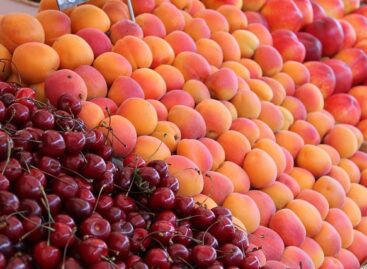Several horticultural crops have been exempted from the EKÁER notification obligation
At the joint initiative of the National Chamber of Agriculture (NAK) and the FruitVeB Hungarian Interprofessional Organization for Fruit and Vegetables, an important amendment has been made to the regulation governing the Electronic Public Road Trade Control System (EKÁER). According to the decree recently published in the Hungarian Gazette, green peas, green beans and sweet corn have been removed from the list of risky products, which means that they are no longer subject to EKÁER reporting requirements.
 In field vegetable production—particularly in the case of sweet corn, green peas and green beans grown for industrial processing—farmers and processing plants have faced significant difficulties in recent years. In addition to increasingly unpredictable weather conditions, market factors also pose serious challenges for the sector. These field-grown vegetables represent the most important raw materials for the domestic food industry, especially for the frozen and canned food sectors. However, the cultivated area of these crops has generally decreased in recent years, making it increasingly difficult to secure the necessary raw material quantities required by the market. It is therefore a vital interest of the processing industry and the entire supply chain that the number of farmers and the area under cultivation should not decrease further. One of the key factors in improving the sector’s competitiveness is the reduction of administrative burdens.
In field vegetable production—particularly in the case of sweet corn, green peas and green beans grown for industrial processing—farmers and processing plants have faced significant difficulties in recent years. In addition to increasingly unpredictable weather conditions, market factors also pose serious challenges for the sector. These field-grown vegetables represent the most important raw materials for the domestic food industry, especially for the frozen and canned food sectors. However, the cultivated area of these crops has generally decreased in recent years, making it increasingly difficult to secure the necessary raw material quantities required by the market. It is therefore a vital interest of the processing industry and the entire supply chain that the number of farmers and the area under cultivation should not decrease further. One of the key factors in improving the sector’s competitiveness is the reduction of administrative burdens.
The harvesting of these field vegetables takes place continuously during the ripening season—24 hours a day, seven days a week, including public holidays—according to the processing plants’ schedules. Under the existing legislation, it was the producer or the integrating producer organization (TÉSZ/TCS) who was required to request an EKÁER number. This meant that from the beginning of pea harvesting (around May 20) until the harvesting of second-crop sweet corn (around October 20), a properly trained administrative staff had to be available 24 hours a day, every single day. Each EKÁER number carries tax implications and must remain verifiable for up to five years, with data content matching the actual transaction. Maintaining an administrative staff on duty around the clock represented an extra cost that created no added value or benefit.
The National Chamber of Agriculture, together with FruitVeB, already initiated the abolition of the EKÁER reporting requirement for these products back in 2022. Although the government initially rejected the proposal, persistent efforts have now succeeded: thanks to the amendment published in the Hungarian Gazette this year, green peas, green beans and sweet corn have been removed from the list of risky products, and EKÁER reporting is no longer required for these categories.
Ensuring EKÁER exemption does not result in any tax loss for the state, since the production and contracting of these crops is carried out exclusively on the basis of pre-concluded product sales contracts. It is not possible for producers to sell on the “free market” without contracts, as all processors secure their full capacity with contracts—typically at the beginning of the given year—in order to guarantee a safe supply of raw materials. The production, sale and road transportation of sweet corn, green peas and green beans destined for industrial processing does not allow for misuse, as the process is specialized, strictly regulated and controlled from multiple aspects. Furthermore, neither party has the possibility nor the interest to sell or purchase without proper accounting documentation.
Related news
In 2025, FruitVeB considered the support and professional coordination of the TÉSZs as its priority task
🎧 Hallgasd a cikket: Lejátszás Szünet Folytatás Leállítás Nyelv: Auto…
Read more >Frost damage devastated last year’s fruit crop
🎧 Hallgasd a cikket: Lejátszás Szünet Folytatás Leállítás Nyelv: Auto…
Read more >2025 brought good quality harvests for open-field vegetable growers
🎧 Hallgasd a cikket: Lejátszás Szünet Folytatás Leállítás Nyelv: Auto…
Read more >Related news
Farewell day at the 60th anniversary EuroShop trade fair
🎧 Hallgasd a cikket: Lejátszás Szünet Folytatás Leállítás Nyelv: Auto…
Read more >








